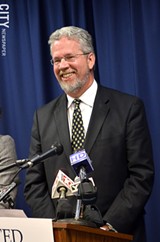ELECTIONS 2012: O'Brien should win Senate slugfest
A preview of state races of local concern
By Jeremy Moule @jfmoule[
{
"name": "500x250 Ad",
"insertPoint": "5",
"component": "15667920",
"parentWrapperClass": "",
"requiredCountToDisplay": "1"
}
]
Republican State Senator Jim Alesi's decision not to seek re-election set off a savage political scramble that only gets uglier and more personal as the election gets closer.
The race between Democrat Ted O'Brien and Republican Sean Hanna for the 55th Senate District is about local representation, but also about control of the Senate. The contest is extremely competitive and will play a key role in whether the Senate has a Republican or Democratic majority.
O'Brien is well-liked and has a good reputation, but he is getting hammered by ads and mailers — many making misleading or outright false claims. Some of the most vicious — and untruthful — ads have been paid for by an anonymous group with a Virginia address that dead-ends at a process server firm.
O'Brien's got a couple of prominent environmental groups on his side, however, and they've gone after Hanna, who once served as regional director for the State Department of Environmental Conservation. EPL/Environmental Advocates of New York recently gave Hanna its Oil Slick award, criticizing Hanna's environmental record. (Hanna's fired back at the groups, which also include the state and national League of Conservation Voters, calling them lobbyists and extremists who give "true environmentalists" a bad name.)
But beyond the sniping and mudslinging, there is substance to this race. Hanna's winding down his first two-year term as a State Assembly member, and O'Brien has served in the Monroe County Legislature since 2004.
O'Brien is the best choice to represent the 55th district, which starts in Irondequoit, takes in much of the city's east side, and ends in the Ontario County town of Naples. He's in tune with the concerns and needs of the district, is respected by Democrats and Republicans, and has consistently questioned county spending practices and the effect they have on property taxes. O'Brien also supports marriage equality, abortion rights, and a raise in the state's minimum wage.
Hanna and O'Brien say property taxes are straining local homeowners and that state requirements on local governments are driving that burden. They point to Medicaid as a prime example. Over time, state officials have expanded the program, passing more and more of the cost to counties. Hanna says he wants the state to fund mandated programs. O'Brien says he wants the state to take over all Medicaid costs — most states do not pass those costs down to counties.
Both candidates also support state policies and incentives to encourage job creation, though O'Brien supports legislation to strip tax subsidies from companies that move jobs out of the country. (Hanna voted against the legislation.) O'Brien also says that the statewide industrial development agency system hasn't always used taxpayer resources wisely.
Some aspects of Hanna's record are troubling. In 2011, he voted against legislation legalizing same-sex marriage. Twice he's voted against legislation to reduce greenhouse gas emissions in the state — he says that should be a federal issue since air pollution doesn't respect state boundaries. But federal inaction has left states to fill the void.
Hanna also voted against a bill to raise the minimum wage; the legislation passed the Assembly but the Senate never voted on it.
The Senate and Assembly have considered and voted on legislation regarding fracking, so it's important to note the candidates' positions on the issue. Hanna says he supports fracking, if it's safe. But he says he also wants to see the results of the State Department of Environmental Conservation's environmental review of fracking before coming to a conclusion. He also says that the DEC will need to draft proper regulations.
O'Brien says protecting the state's freshwater resources needs to be the priority. But if state officials green-light the technique, then they also need to make sure DEC has enough resources to effectively monitor and regulate the industry, he says.
Monroe County has two other contested Senate races that will help decide which party holds the majority in that chamber. In the 61st district, which is anchored in Erie County but includes Riga, Chili, and part of the city, incumbent Republican Michael Ranzenhofer faces a challenge from Democrat Justin Rooney. And in the 62nd district, which is focused mostly on Niagara and Orleans counties, incumbent Republican George Maziarz is opposed by Democrat Amy Hope Witryol and Green Party candidate Jonathon Benedict.
Monroe County is also home to three Senate districts where the incumbent is uncontested: Republican Joe Robach in the 56th District, which includes Hamlin, Clarkson, Parma, Greece, Gates, part of the city, and the town of Brighton; Republican Patrick Gallivan in the 59th District, which includes Wheatland and Henrietta; and Republican Michael Nozzolio in the 54th District, which includes Webster.
City is not endorsing one party over the other for control of the Senate. Republicans have failed to act on important issues, such as the minimum-wage increase. But when Democrats held the majority in 2009 and 2010, they were not effective leaders.
While Democrats are expected to keep the Assembly majority — just as in the Senate, the contorted, gerrymandered districts protect the majority party — Republicans are trying to grow the size of their conference. And there are several contested races. City is reserving its endorsement, except in one crucial, city-based district.
In the 138th district, which includes a question mark-shaped section of the city as well as the towns of Henrietta and Chili, we're endorsing Democrat Harry Bronson, who faces a challenge from Republican Peterson Vazquez.
Bronson says he considers his vote in favor of the state's marriage equality law as his most significant accomplishment, calling it a historical piece of civil rights legislation. Bronson is a long-time LGBT activist and worked on marriage equality and related issues well before he was elected to the Assembly.
Bronson has backed important anti-discrimination legislation in the Assembly. He voted for legislation to prohibit discrimination based on a person's gender identity or expression, as well as a package of pay equity bills. Both passed the Assembly, but stalled in the Senate.
Bronson has also backed important economic legislation like the minimum-wage increase — which the Senate hasn't passed — and the statewide tax cap. And he says he wants the state, counties, and local governments to work together to eliminate redundant business permitting programs.
On fracking, Bronson says he supports a moratorium until sufficient regulations are put in place to safeguard water, the environment, and people.
The DEC is right to take its time in its review of fracking, Bronson says, and he supports the state's plans for a health assessment. He's also voted in favor of classifying fracking waste fluid as hazardous waste. And he says state officials need to look at DEC staffing levels.
Vazquez, a veteran and small business owner, says his priority is education and that prepared and successful students will encourage economic development. Specifically, he says extending the school day would boost student performance.
A longer day would mean more time for teachers to spend with students, Vazquez says, and less time for students to hang out on the streets. It would also relieve many parents of the burden of finding after-school care and the costs associated with that care, he says.
The idea of an extended school day is worth exploring, and Rochester schools Superintendent Bolgen Vargas has started those discussions.
But Vazquez also says that school districts should stress abstinence and shouldn't offer comprehensive sexual education. He says he wouldn't try to circumvent the state's marriage-equality law, but that the law is not in line with his religious beliefs. And he's been endorsed by the New York State Right to Life Committee.
On a minimum-wage increase, Vazquez says he'd prefer to see a plan or initiative for economic growth. He says he's not convinced that a minimum-wage increase makes sense on its own.
Vazquez says he's not opposed to hydraulic fracturing for natural gas, and that it has potential to create a lot of jobs. But safety is paramount, he says.
Incumbent Democrat David Gantt had a resounding win in the 137th district primary — more than doubling the combined votes received by his two challengers. The district includes Gates and a chunk of the city.
Gantt faces a general election challenge from Green Party candidate Drew Langdon. Langdon says it's important for voters to have an alternative.
Langdon's chief issue is worker-owned cooperative businesses. He says he wants the state to establish a program for loans and grants for workers trying to form a cooperative business. It would also help cooperatives purchase existing businesses, he says. The state could use revenues from its stock transfer tax —which are currently rebated to Wall Street — to replenish the fund, he says. Similarly, the state could take steps to encourage housing cooperatives, Langdon says.
Democrat Randy Weaver and Republican Bill Nojay are running for an open seat in the 133rd Assembly District. Former Avon Mayor Richard Burke, who lost to Nojay in a Republican primary, is on the Conservative line.
Weaver is a Steuben County legislator and a pharmacist who until recently owned his own pharmacy. Nojay is an attorney and conservative talk radio host. He's also a former chair of the Rochester Genesee Regional Transportation Authority board. During his time in that position he pushed for a downtown transit center — an idea that later morphed into the failed Renaissance Square project, though Nojay had left the RGRTA board by that point.
In the 135th district, which covers Webster, Penfield, Perinton, and East Rochester, incumbent Republican Mark Johns faces a challenge from Democrat David Koon. Johns unseated Koon, who represented the district for 14 years, in 2010. Johns is emphasizing his support for economic development programs and reduced state spending. Koon is focusing on similar issues, but also supports campaign finance reform.
Incumbent Republican Stephen Hawley faces a challenge from Libertarian candidate Mark Glogowski in the 139th Assembly District. The only parts of Monroe County in that district are Hamlin, Sweden, and Clarkson.
Incumbent Assembly members Bill Reilich, a Republican, and Democrat Joe Morelle are running unopposed for their seats.
This is a corrected version of the story.In This Guide...
Speaking of...
Latest in Elections
More by Jeremy Moule
-

ROCHESTER TEN
ANNETTE RAMOSAug 1, 2023 - More »















